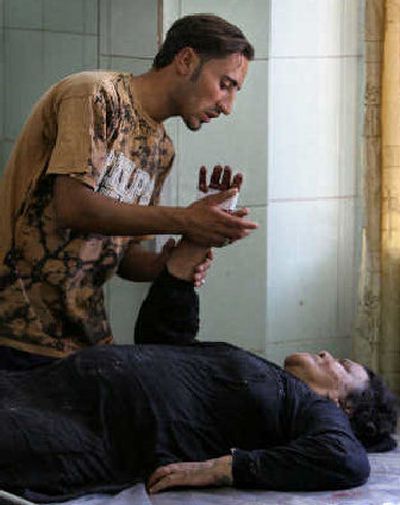Sectarian warfare rages in Iraq

BAGHDAD, Iraq – Shiite militiamen and Sunni Arab insurgents went on murderous sprees here Sunday, killing at least 60 people in shootings and bombings in a bloody outbreak that raised the specter of a city sinking deeper into sectarian warfare.
The Sunday morning killings of at least 36 Sunni Arab men by Shiite militiamen in the Jihad neighborhood, in apparent retaliation for a mosque bombing the previous night, were among the most serious examples of open street warfare between Shiites and Sunnis.
The execution-style killings immediately set off a political firestorm, with one Sunni leader accusing the government of negligence and Prime Minister Nouri al-Maliki, a Shiite, downplaying the events, insisting that the “situation in Baghdad is under control.”
But as dusk settled, a pair of car bombs apparently set off by Sunni Arab insurgents damaged a Shiite mosque in a northern Baghdad neighborhood, killing at least 19 worshippers and wounding 59 others, possibly setting the stage for another round of reprisal killings by Shiite gunmen.
The violence came the same day the U.S. military announced that five more U.S. soldiers have been charged in connection with the alleged rape of an Iraqi and the slaying of the young woman and her family in March. Four soldiers were charged with rape and murder, the fifth with dereliction of duty. None was named.
Last week, a former U.S. Army private, Steven D. Green, was charged with rape and murder in federal court in Charlotte, N.C. He pleaded not guilty.
The sectarian violence underscored a dramatic worsening of security conditions in the capital even after the formation of a government in May and the imposition of a massive lockdown by Iraqi troops and police. It also raised fears that the beleaguered country might soon dissolve into all-out civil war.
Sunni Arab politicians, who have already threatened to pull out of the nascent government, blamed the violence on Shiites, demanding that security forces crack down on militias who are believed to operate in part out of the security services.
“Acts of militias are now being expanded in Baghdad and they have become a source of concern and harm to people,” said Vice President Tariq Hashimi, the head of the largest Sunni Party, adding that the government needed to “safeguard the lives of the innocent, who have become targets for these militias.”
Violence in the religiously mixed Jihad neighborhood began Saturday morning after a suicide bombing at a Shiite mosque killed at least eight worshippers and passersby, officials said.
Early Sunday, militiamen began roaming the neighborhood and setting up checkpoints, asking those trying to pass through to show their identity papers, which give name and tribe – both clues to whether the bearer might be Sunni or Shiite.
One witness, who asked not to be identified, said Shiite gunmen took to the streets about 7 a.m. and established a roadblock a short distance from his home. He said a neighbor of his, a Sunni, was loaded on to a bus filled with gunmen after he showed his identity papers.
“There have been some problems in this neighborhood,” said the witness. “But it never reached killing because you showed the wrong identification card.”
By midmorning, a number of bodies were strewn about the streets and Sunni insurgents had set up their own roadblocks nearby in retaliation.
An official at a hospital where bodies were taken said at least 36 young Sunni men were killed, many pulled from their homes or vehicles. Also among the dead from the fighting was a Shiite family of five, a mother and four children, who were killed when gunmen tossed a grenade into their home, hospital officials who received the victims said.
At midmorning, Iraqi and U.S. troops sealed off the area, with helicopters whizzing above. The neighborhood is only a short distance from the U.S. military headquarters here, located adjacent to the Baghdad International Airport.
The Saturday-night car bomb that apparently triggered the attack took place a short distance from the Zahra Shiite mosque. At least eight people were killed and more than a dozen others were wounded in the explosion, a hospital official said.
A number of Shiite and Sunni mosques have been attacked in recent days, each apparently in reprisal for the other.
In the aftermath of the killings Sunday morning, the prime minister’s office issued a brief statement saying that some media reports overstated the seriousness of the situation.
“The situation in Baghdad is under control and the concerned apparatuses are dealing with what is going on,” said the statement.
However, Iraqi President Jalal Talabani, a Kurd, described Iraq as being “upon a dangerous edge.” He called on Iraqis to remain calm and avoid any immediate response to the killings, but also to be watchful.
“What happened today requires us to be honest with ourselves and others to condemn these horrendous actions loudly,” he said.
Also Sunday, two Sunni clerics from the Muslim Scholars Association were killed in Samarra as they were driving away from a local mosque. A car pulled alongside them and gunmen dressed in camouflage and black masks shot the clerics and sped off.
Officials in the increasingly violent northern city of Kirkuk, at the heart of a volatile oil-rich province claimed by ethnic Kurds, Arabs and Turkoman, said at least four police and civilians were killed and six injured in various shootings and bombings throughout the city.